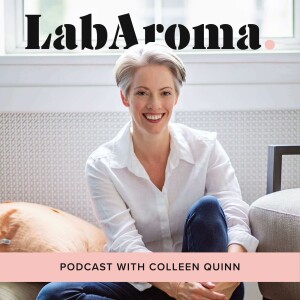
The LabAroma Podcast by Colleen Quinn
Education

005 Kelly Ablard - Conservation is the protection and preservation of biodiversity
 2019-04-30
2019-04-30
Download
Right click and do "save link as"
Dr Kelly Ablard is a certified and registered complementary and alternative medicine practitioner who holds a Doctorate in Biology, a Master’s in Primate Conservation, and a Bachelor of Science (Hons) in Zoology. Kelly’s expertise is rooted in her scientific investigation of (and profound love for) plants and animals.
Kelly is currently conducting research on the conservation and preservation of more than 400 plant species producing essential and vegetable oils. As Kelly says, we all have the responsibility to protect and preserve the plants that we depend upon. With the demand and use of essential oils constantly increasing, it is fundamental that we keep ourselves informed of species that are endangered, by acquiring additional knowledge and keeping abreast of conservation status.
In this week’s inspiring podcast conversation Kelly and I discuss the status which the International Union for the Conservation of Nature (IUCN) has allocated to certain plants ranging from critically endangered, endangered to vulnerable. Kelly is committed to the work of educating sellers and consumers about which oils are threatened and / or overexploited. We talk about how by understanding these statues we can offer alternatives or buy the oils from conservation projects, thus contributing to their preservation - every drop counts!
Visit Kelly’s website for more information and studies here https://www.kellyablard.com/conservation/conservation-of-essential-oil-and-carrier-oil-bearing-plants/
Also visit Kelly’s Go Fund Campaign here and support this wonderful and important cause https://www.gofundme.com/conservation-amp-education-peru
To learn more about plants & your health from Colleen at LabAroma check out this informative PDF: https://www.labaroma-education.com/pl/2147628476
Disclaimer: The information presented in this podcast is for educational purposes only, and is not intented to replace professional medical advice. Please consult your doctor if you are in need of medical care, and before making any changes to your health routine.
view more
Kelly is currently conducting research on the conservation and preservation of more than 400 plant species producing essential and vegetable oils. As Kelly says, we all have the responsibility to protect and preserve the plants that we depend upon. With the demand and use of essential oils constantly increasing, it is fundamental that we keep ourselves informed of species that are endangered, by acquiring additional knowledge and keeping abreast of conservation status.
In this week’s inspiring podcast conversation Kelly and I discuss the status which the International Union for the Conservation of Nature (IUCN) has allocated to certain plants ranging from critically endangered, endangered to vulnerable. Kelly is committed to the work of educating sellers and consumers about which oils are threatened and / or overexploited. We talk about how by understanding these statues we can offer alternatives or buy the oils from conservation projects, thus contributing to their preservation - every drop counts!
Visit Kelly’s website for more information and studies here https://www.kellyablard.com/conservation/conservation-of-essential-oil-and-carrier-oil-bearing-plants/
Also visit Kelly’s Go Fund Campaign here and support this wonderful and important cause https://www.gofundme.com/conservation-amp-education-peru
To learn more about plants & your health from Colleen at LabAroma check out this informative PDF: https://www.labaroma-education.com/pl/2147628476
Disclaimer: The information presented in this podcast is for educational purposes only, and is not intented to replace professional medical advice. Please consult your doctor if you are in need of medical care, and before making any changes to your health routine.
More Episodes
062 Colleen King - Sourcing kindly
 2020-12-08
2020-12-08
 2020-12-08
2020-12-08
057 Sam Coffman - The military herbal medic
 2020-11-03
2020-11-03
 2020-11-03
2020-11-03
055 Dr Dustin Sulak - The restored self
 2020-10-20
2020-10-20
 2020-10-20
2020-10-20
051 Jill Cloutier - Earth care & people care
 2020-09-21
2020-09-21
 2020-09-21
2020-09-21
048 Heather Irvine - Immunity & Adaptogens
 2020-08-31
2020-08-31
 2020-08-31
2020-08-31
012345678910111213141516171819
Create your
podcast in
minutes
- Full-featured podcast site
- Unlimited storage and bandwidth
- Comprehensive podcast stats
- Distribute to Apple Podcasts, Spotify, and more
- Make money with your podcast
It is Free
- Privacy Policy
- Cookie Policy
- Terms of Use
- Consent Preferences
- Copyright © 2015-2024 Podbean.com




